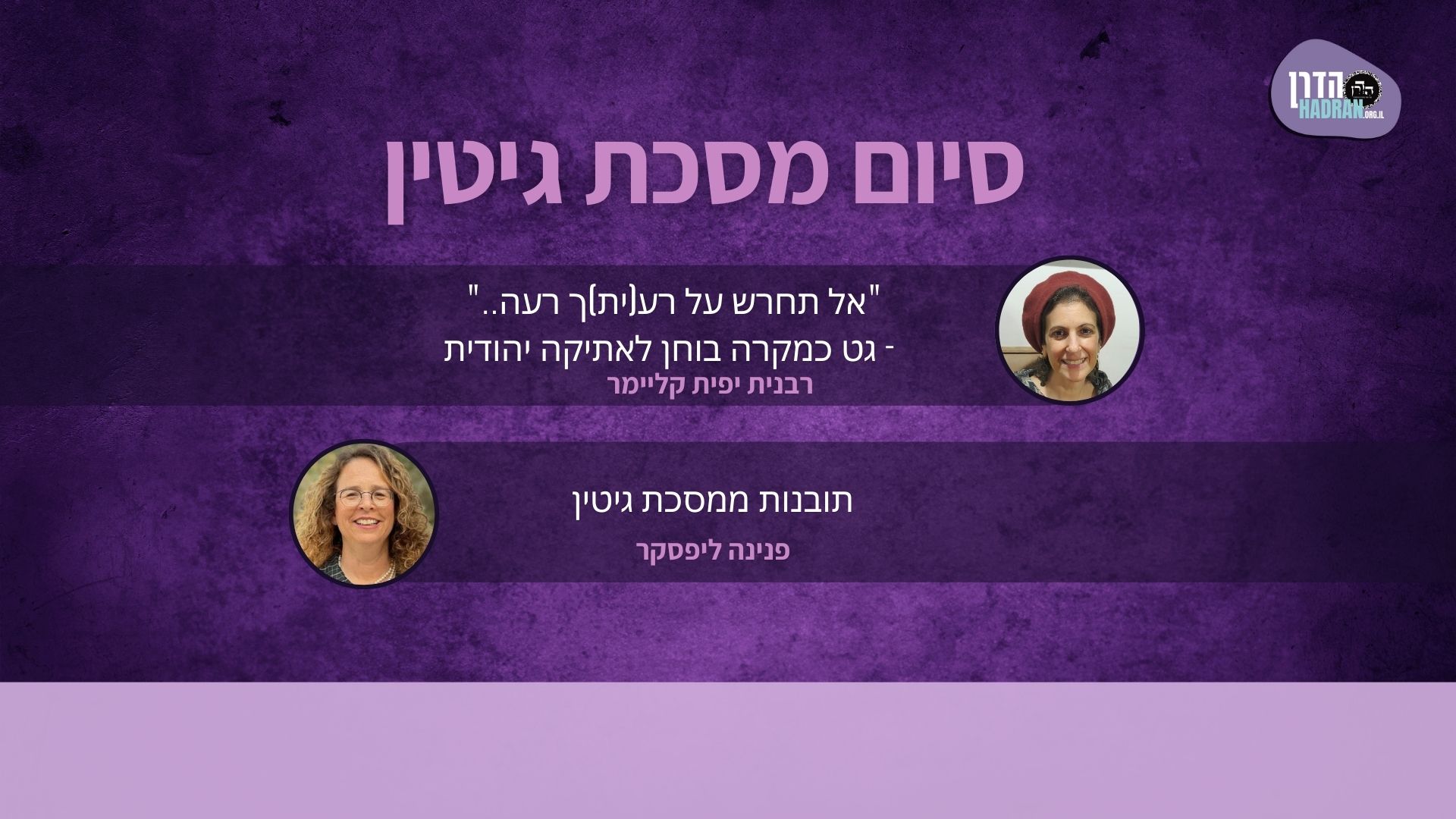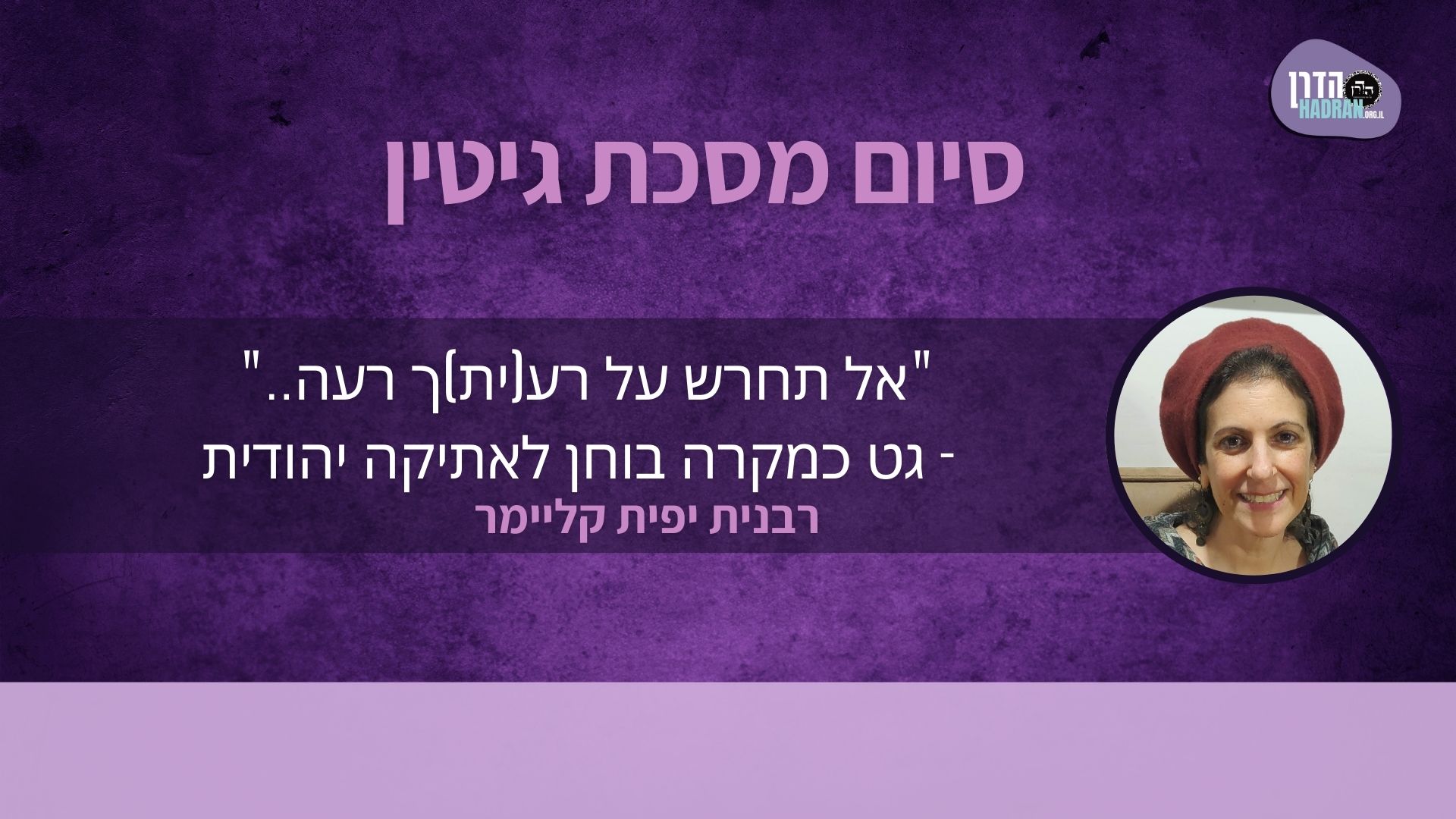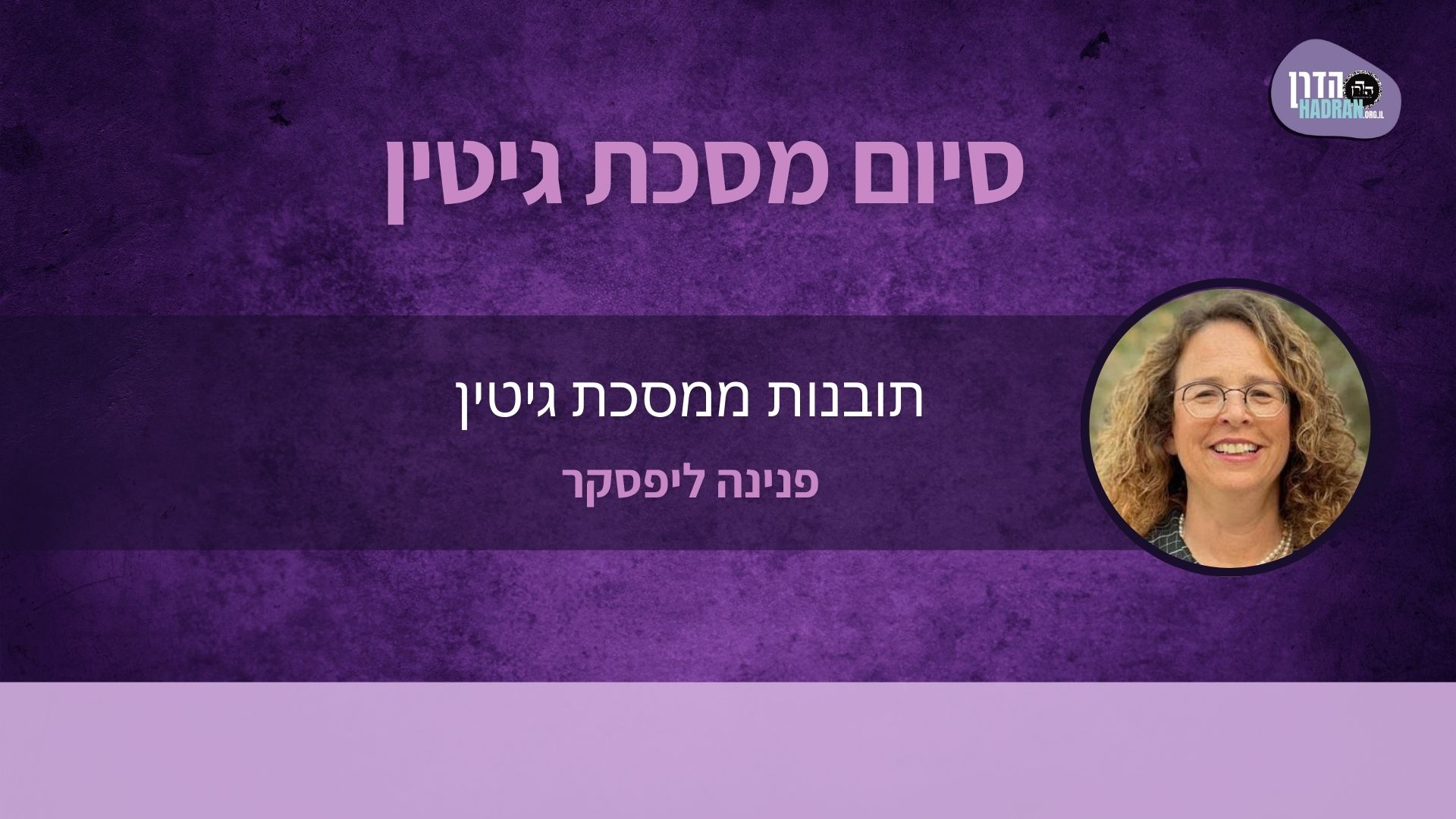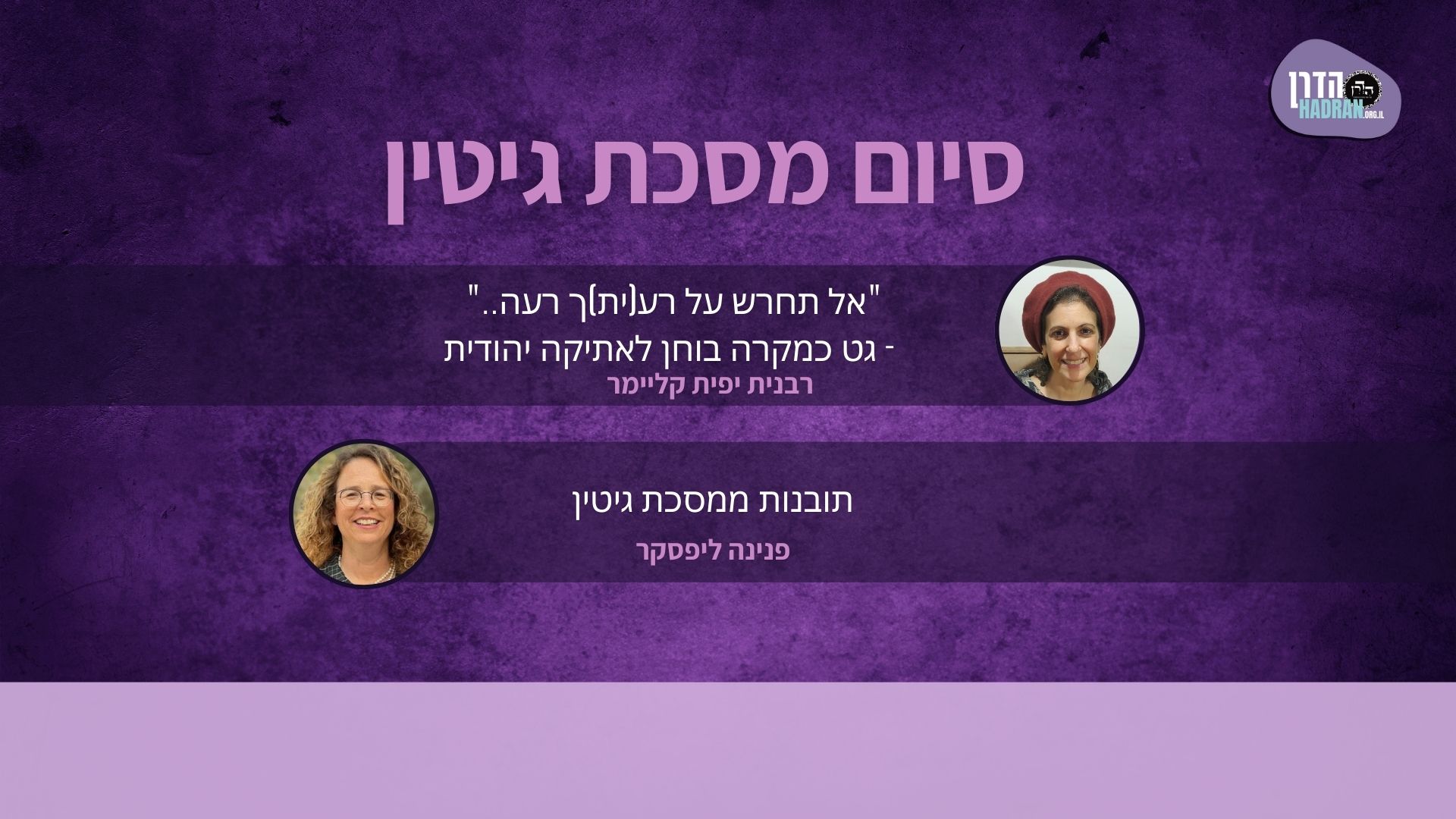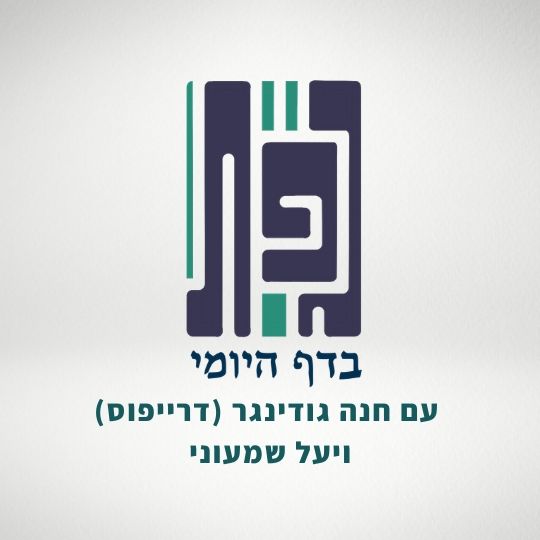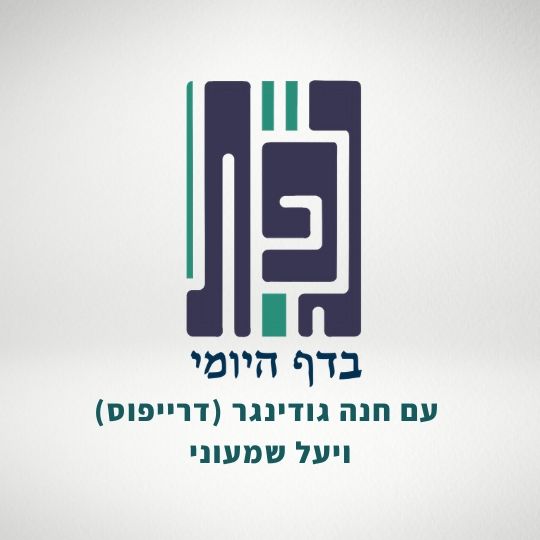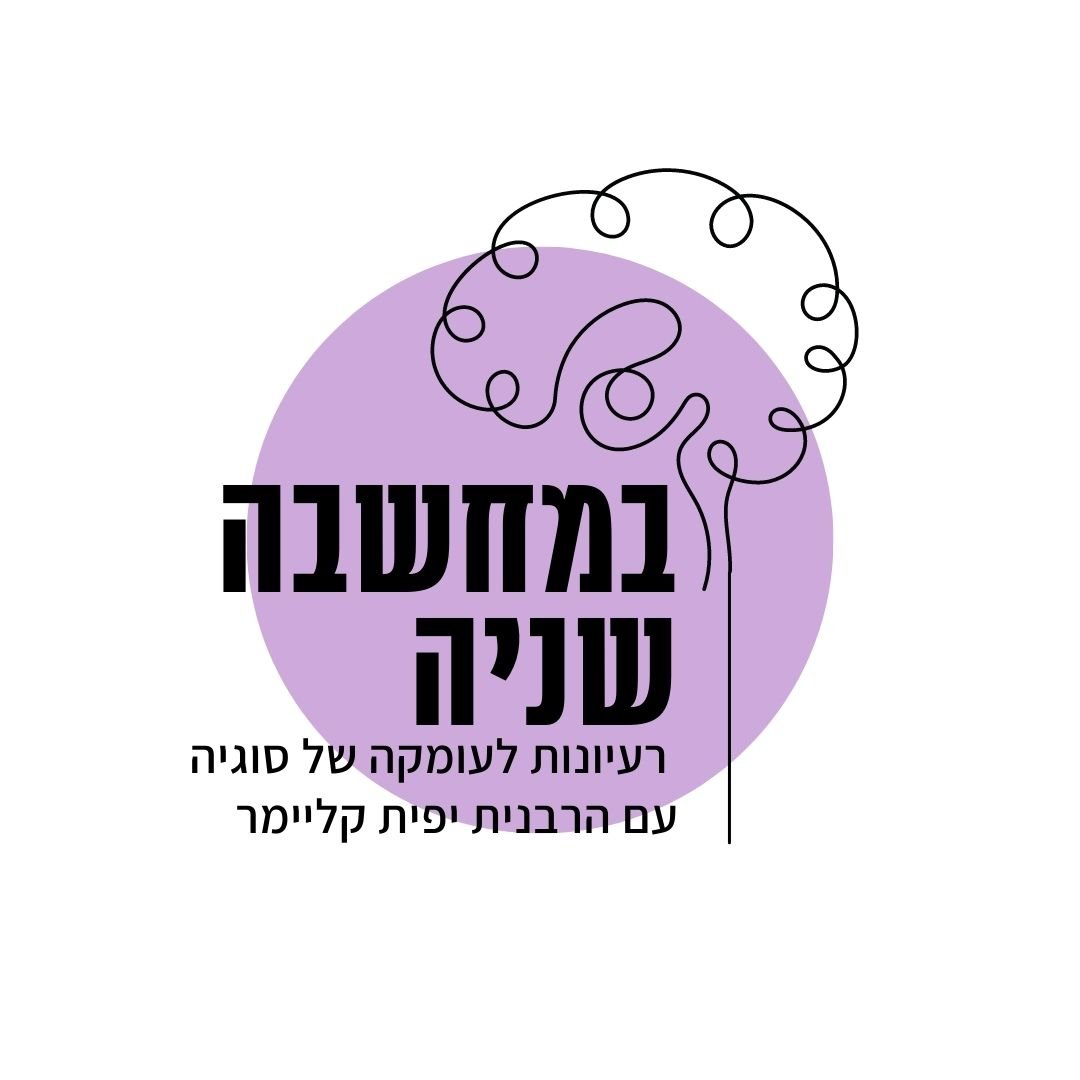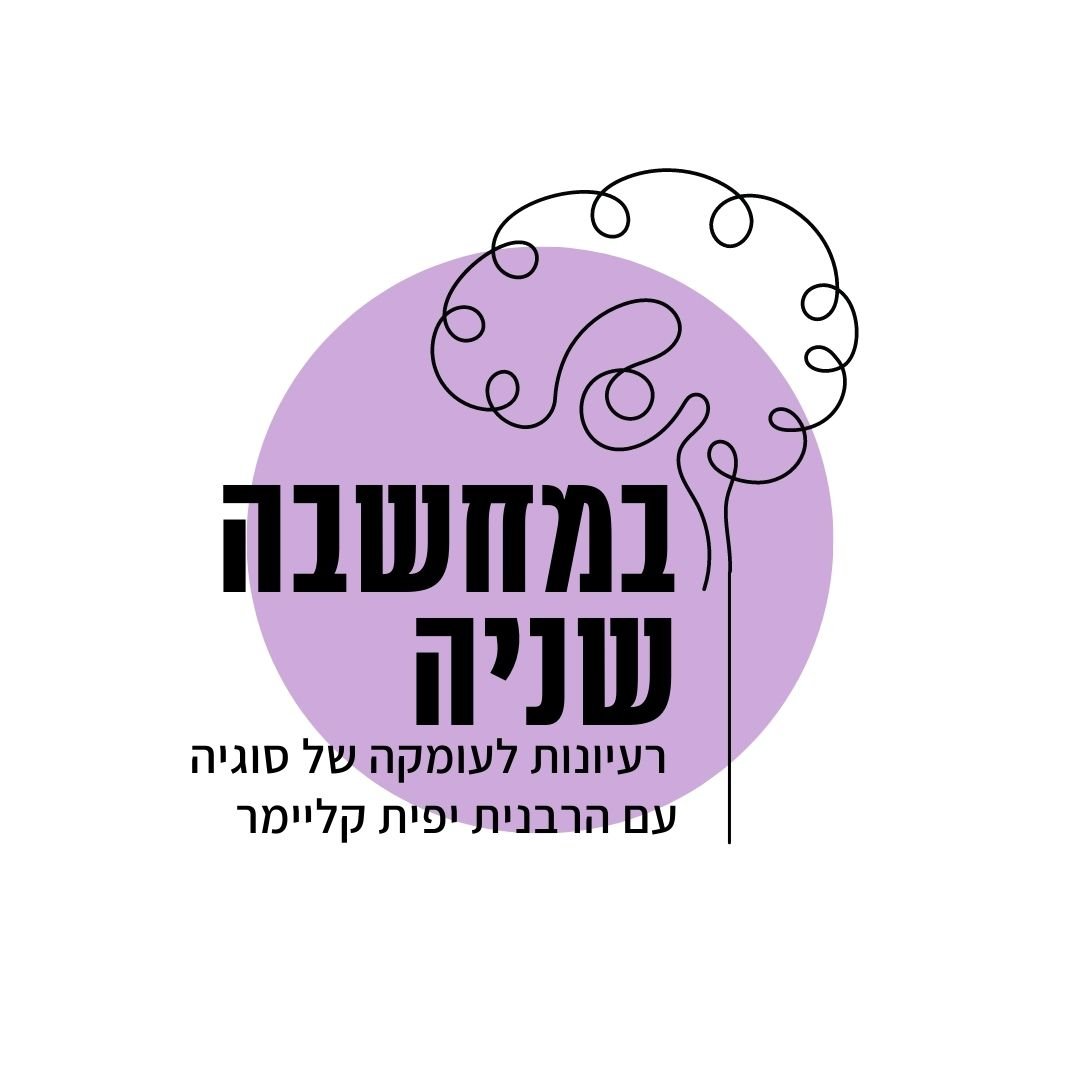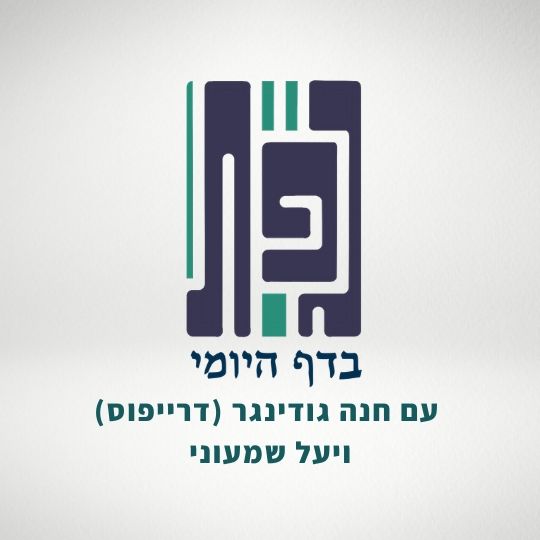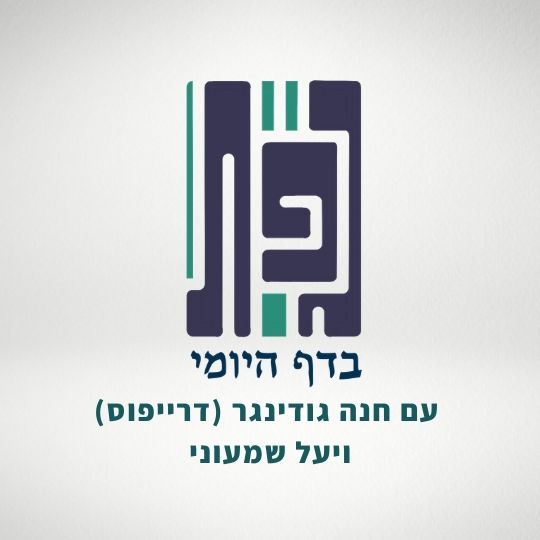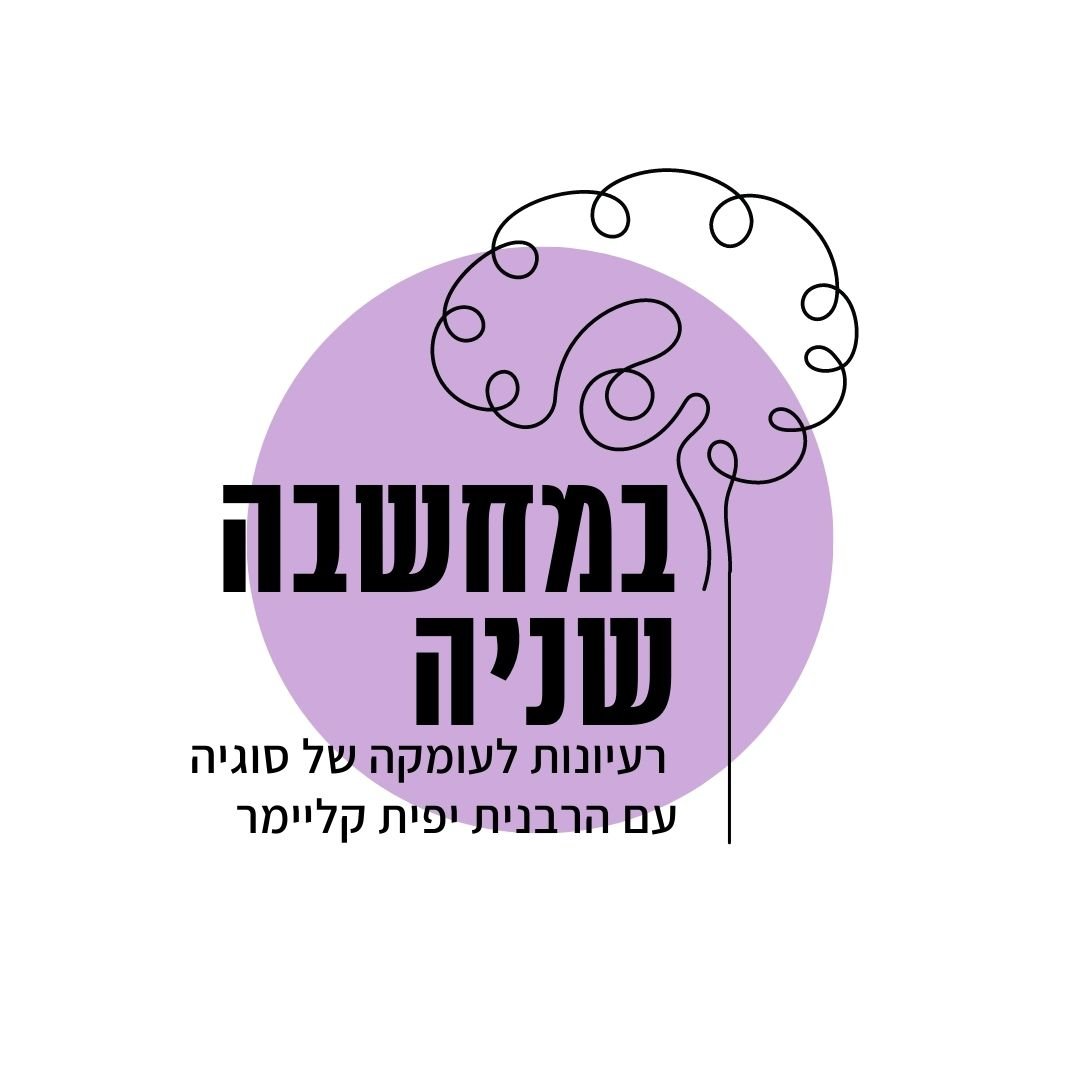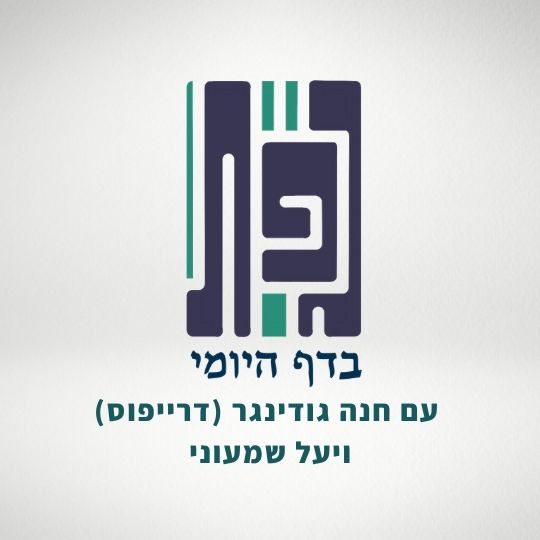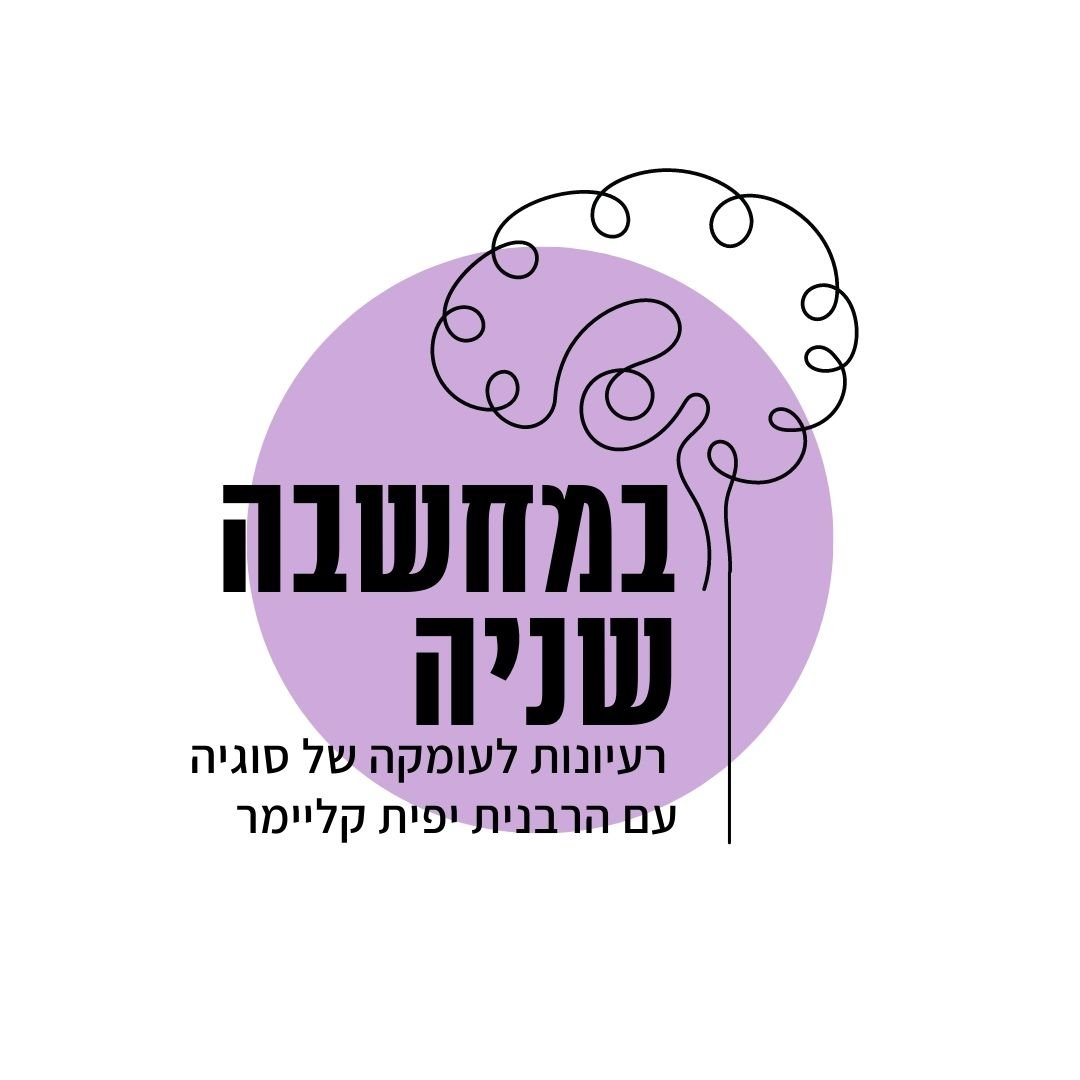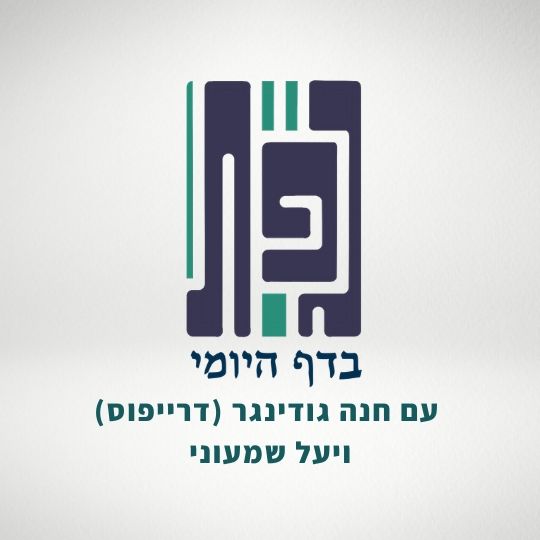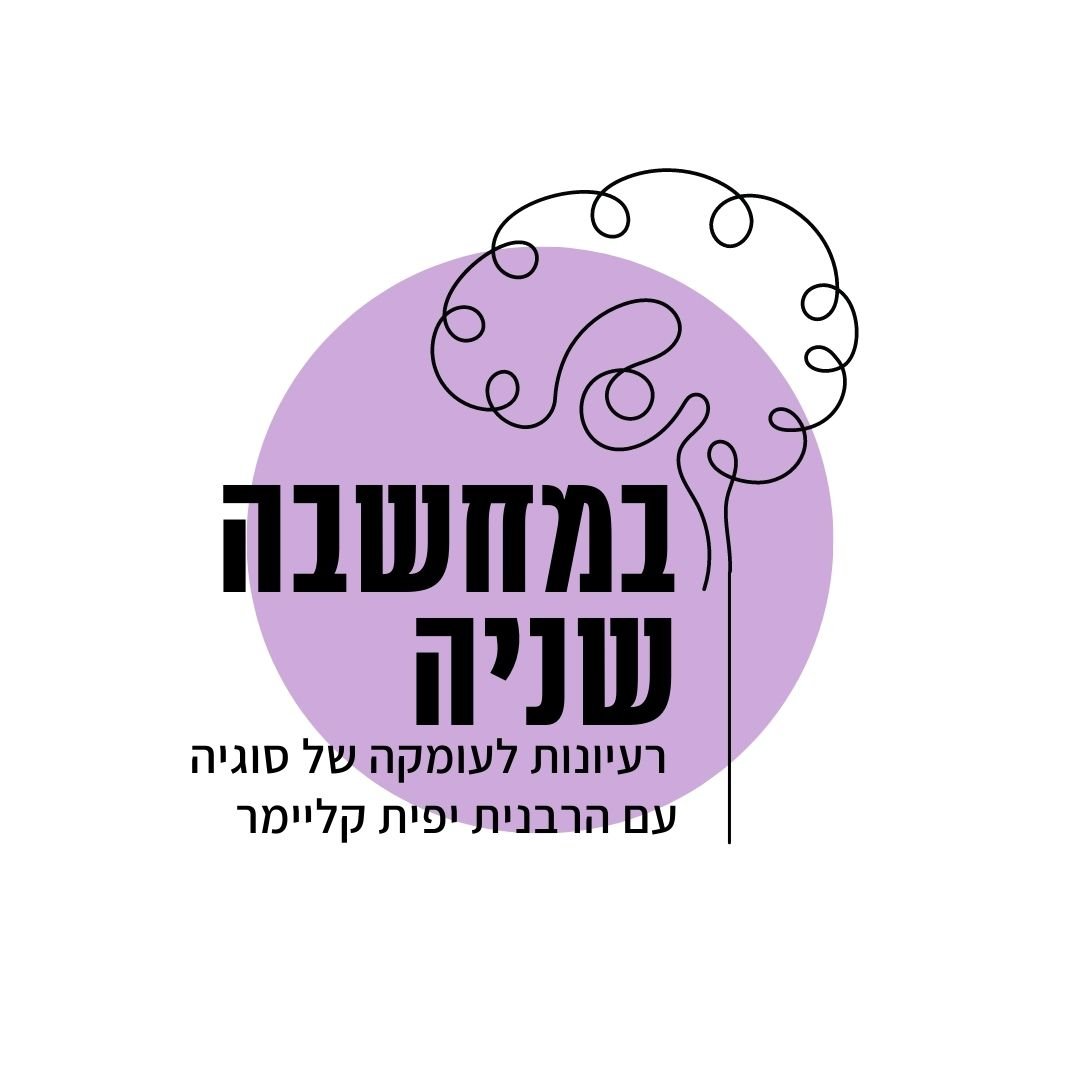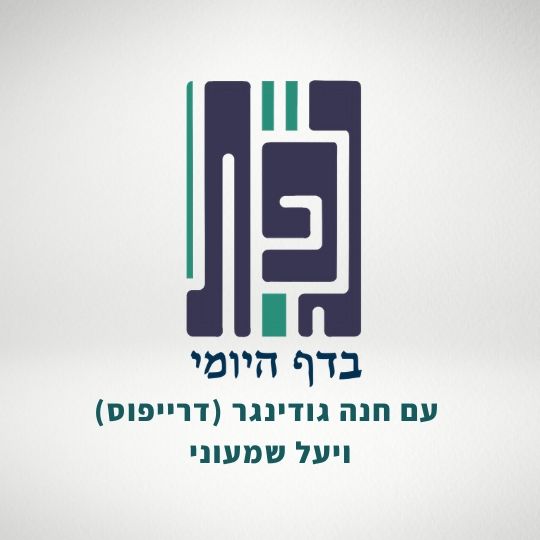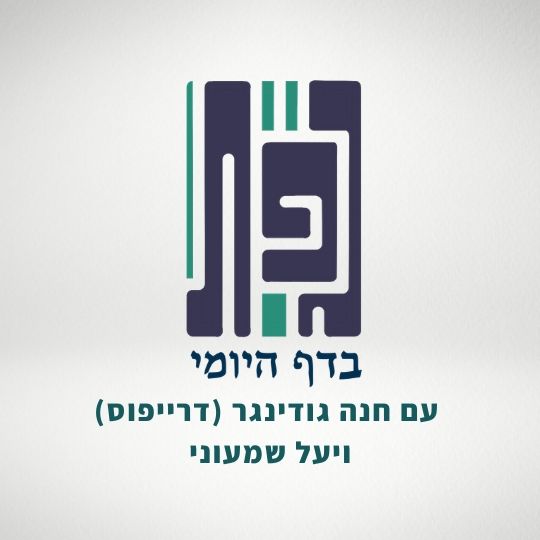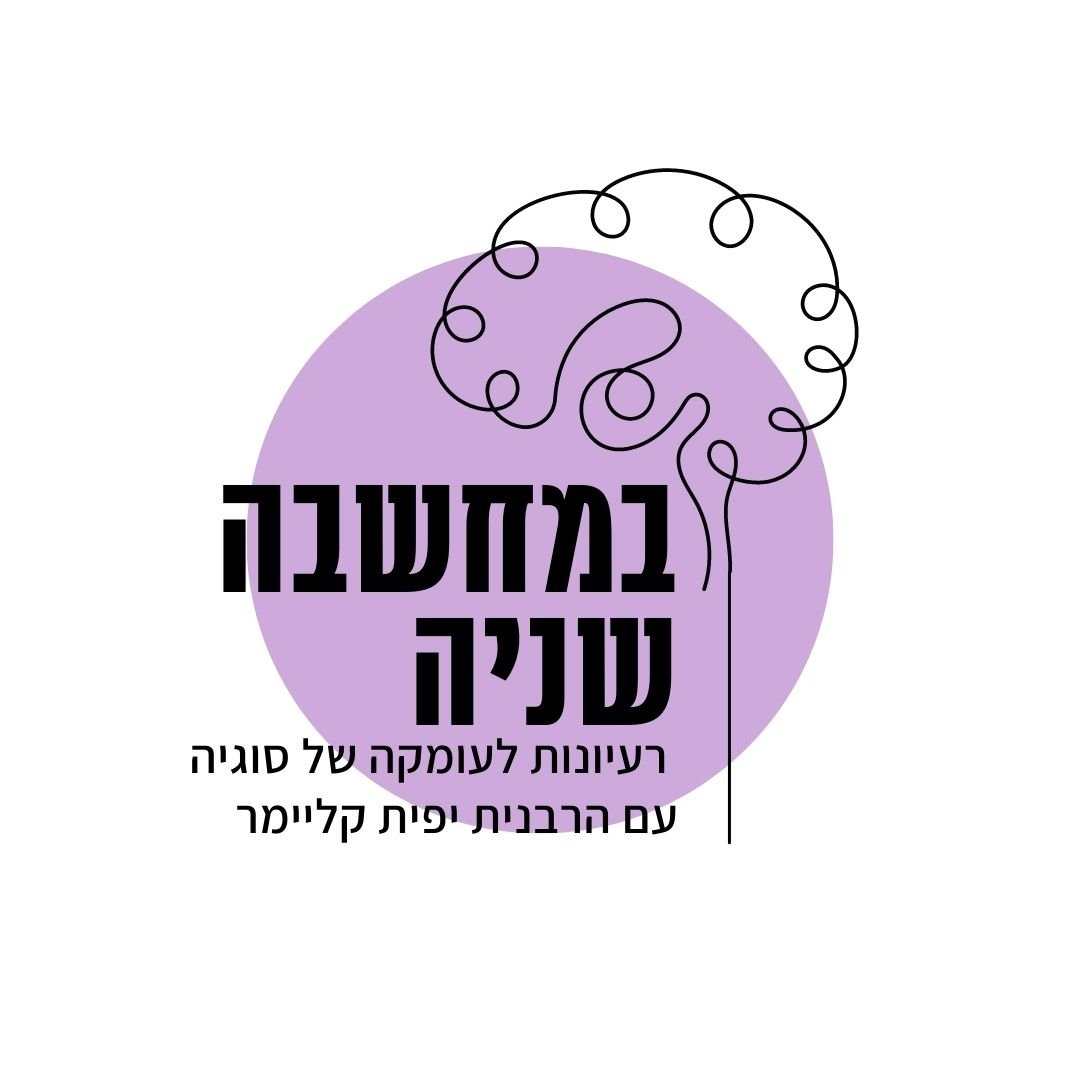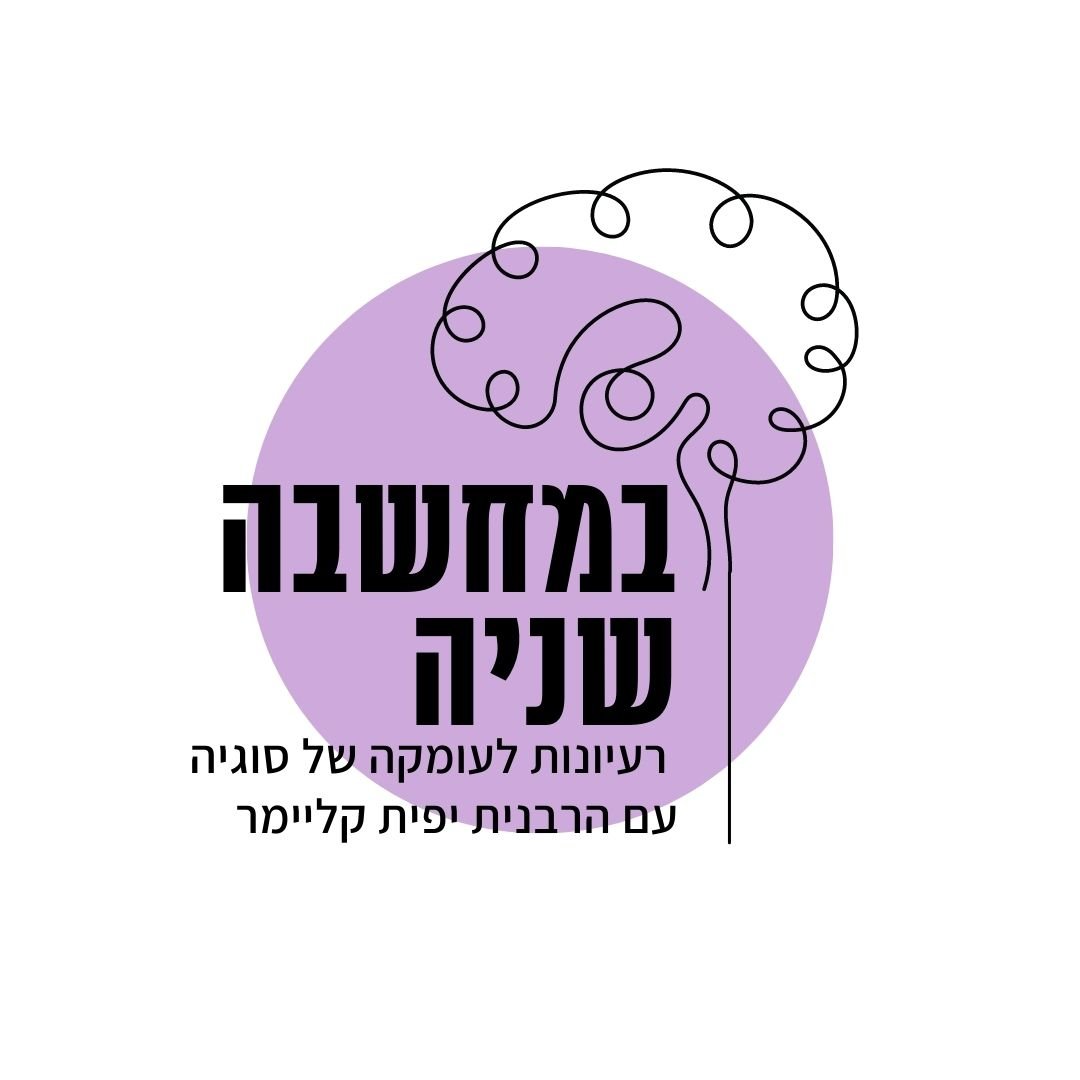הלימוד השבוע מוקדש ע”י חני פנשטיין לע”נ אביה, מאיר פנשטיין, שאהב ללמוד תורה.
הלימוד השבוע מוקדש לזכות ולשלום הַיְימׇנוֹט אֱמוּנָה בַּת באנצ’י (קָסָאוּ) בת 11 שנעלמה במקום מגוריה בצפת, לפני שנתיים, ביום ט”ז אדר תשפ”ד (25.2.24), ולא נודעו עקבותיה.
הלימוד השבוע מוקדש למען ביטחון המדינה, החיילים והאזרחים, ולמען חירותו של העם האיראני. שנזכה בקרוב שיתקיים בנו הפסוק: "לַיְּהוּדִים הָיְתָה אוֹרָה וְשִׂמְחָה וְשָׂשֹׂן וִיקָר”.
רוצה להקדיש שיעור?

תקציר
כלים
הלימוד השבוע מוקדש לזכות ולשלום הַיְימׇנוֹט אֱמוּנָה בַּת באנצ’י (קָסָאוּ) בת 11 שנעלמה במקום מגוריה בצפת, לפני שנתיים, ביום ט”ז אדר תשפ”ד (25.2.24), ולא נודעו עקבותיה.
הלימוד השבוע מוקדש למען ביטחון המדינה, החיילים והאזרחים, ולמען חירותו של העם האיראני. שנזכה בקרוב שיתקיים בנו הפסוק: "לַיְּהוּדִים הָיְתָה אוֹרָה וְשִׂמְחָה וְשָׂשֹׂן וִיקָר”.
כלים
העמקה
רוצה להבין מה באמת קורה מתחת לפני השטח של הסוגיה?
שיעורים, פודקאסטים והרחבות של מיטב המורות שלנו יפתחו לך עוד זוויות וכיווני חשיבה.
חדשה בלימוד הגמרא?
זה הדף הראשון שלך? איזו התרגשות עצומה! יש לנו בדיוק את התכנים והכלים שיעזרו לך לעשות את הצעדים הראשונים ללמידה בקצב וברמה שלך, כך תוכלי להרגיש בנוח גם בתוך הסוגיות המורכבות ומאתגרות.
פסיפס הלומדות שלנו
גלי את קהילת הלומדות שלנו, מגוון נשים, רקעים וסיפורים. כולן חלק מתנועה ומסע מרגש ועוצמתי.
גיטין פג
מַאי דַּאֲסַר שְׁרָא; ״לִרְאוּבֵן״, מַהוּ? לִרְאוּבֵן – וְהוּא הַדִּין לְשִׁמְעוֹן, וְהַאי דְּקָאָמַר לִרְאוּבֵן – מִשּׁוּם דִּפְתַח בֵּיהּ; אוֹ דִלְמָא – לִרְאוּבֵן דַּוְקָא?
that what he initially forbade he then permitted, enabling her to marry anyone she wishes, what is the halakha if he said the second time that she is permitted to marry Reuven? Did he mean that she is permitted to marry Reuven and the same is true with regard to Shimon, i.e., she is permitted to marry him as well? Is the fact that he mentioned only that she is permitted to marry Reuven because he opened his prior qualification by mentioning him before he mentioned Shimon, but he intended to permit her to marry Shimon as well? Or did he, perhaps, specifically intend to permit her to marry Reuven?
וְאִם תִּמְצָא לוֹמַר ״לִרְאוּבֵן״ דַּוְקָא; ״לְשִׁמְעוֹן״, מַהוּ? לְשִׁמְעוֹן – וְהוּא הַדִּין לִרְאוּבֵן, וְהַאי דְּקָאָמַר ״שִׁמְעוֹן״ – מִשּׁוּם דִּסְלֵיק מִינֵּיהּ; אוֹ דִלְמָא – לְשִׁמְעוֹן דַּוְקָא?
And if you say that he intended to permit her to marry specifically Reuven and not Shimon, what is the halakha if he said that she is permitted to marry Shimon? Did he mean that she is permitted to marry Shimon and the same is true with regard to Reuven, and the fact that he mentioned only Shimon is because he ended his initial previous statement by mentioning him? Or perhaps he was specifically referring only to Shimon?
בָּעֵי רַב אָשֵׁי: ״אַף לְשִׁמְעוֹן״, מַהוּ? ״אַף״ – אַרְאוּבֵן קָאֵי; אוֹ דִלְמָא, ״אַף״ – אַעָלְמָא קָאֵי? תֵּיקוּ.
Rav Ashi raises another dilemma with regard to the same case: If he said to her the second time: You are also permitted to marry Shimon, what is the halakha? Is the word also referring to Reuven, i.e., she is permitted to marry Shimon in addition to Reuven, or perhaps it is also referring to everyone, i.e., she is permitted to marry Shimon in addition to all men, but not Reuven? The dilemma shall stand unresolved.
תָּנוּ רַבָּנַן: לְאַחַר פְּטִירָתוֹ שֶׁל רַבִּי אֱלִיעֶזֶר, נִכְנְסוּ אַרְבָּעָה זְקֵנִים לְהָשִׁיב עַל דְּבָרָיו, אֵלּוּ הֵן: רַבִּי יוֹסֵי הַגְּלִילִי, וְרַבִּי טַרְפוֹן, וְרַבִּי אֶלְעָזָר בֶּן עֲזַרְיָה, וְרַבִּי עֲקִיבָא.
§ The Sages taught (Tosefta 9:1): After the death of Rabbi Eliezer, four Sages entered the discussion to refute his statement. They were: Rabbi Yosei HaGelili, Rabbi Tarfon, Rabbi Elazar ben Azarya, and Rabbi Akiva.
נַעֲנָה רַבִּי טַרְפוֹן וְאָמַר: הֲרֵי שֶׁהָלְכָה זוֹ, וְנִישֵּׂאת לְאָחִיו שֶׁל זֶה שֶׁנֶּאֶסְרָה עָלָיו, וּמֵת בְּלֹא בָּנִים – לֹא נִמְצָא זֶה עוֹקֵר דָּבָר מִן הַתּוֹרָה? הָא לָמַדְתָּ, שֶׁאֵין זֶה כְּרִיתוּת.
Rabbi Tarfon responded to Rabbi Eliezer’s opinion, saying: If after the husband stipulated that the wife not marry a certain man she went and married the brother of the one to whom she was prohibited from marrying, and this husband died without children, she cannot perform levirate marriage with her husband’s brother, because he is forbidden to her due to the stipulation of her first husband. Is the first husband not found to be uprooting a matter of Torah law through his stipulation? You have therefore derived that this is not an act of severance. The divorce is not valid, as the Torah would not sanction a manner of divorce that can cause a mitzva to be nullified.
נַעֲנָה רַבִּי יוֹסֵי הַגְּלִילִי וְאָמַר: הֵיכָן מָצִינוּ אָסוּר לָזֶה וּמוּתָּר לָזֶה? הָאָסוּר – אָסוּר לַכֹּל, וְהַמּוּתָּר – מוּתָּר לַכֹּל! הָא לָמַדְתָּ, שֶׁאֵין זֶה כְּרִיתוּת.
Rabbi Yosei also responded to Rabbi Eliezer’s opinion, saying: Where do we find an example of something that is forbidden to this person and permitted to that other person? What is forbidden is forbidden to everyone, and what is permitted is permitted to everyone. This contradicts Rabbi Eliezer’s opinion that a divorcée can be prohibited from marrying a certain man and permitted to marry all other men. You have therefore derived that this is not an act of severance.
נַעֲנָה רַבִּי אֶלְעָזָר בֶּן עֲזַרְיָה וְאָמַר: ״כְּרִיתוּת״ – דָּבָר הַכּוֹרֵת בֵּינוֹ לְבֵינָהּ. הָא לָמַדְתָּ, שֶׁאֵין זֶה כְּרִיתוּת.
Rabbi Elazar ben Azarya responded, saying: What is the meaning of the expression: “Scroll of severance,” which is used in the Torah for a bill of divorce? It means something that severs the bond between him and her entirely. This woman, by contrast, is still bound to her husband after their divorce, as his stipulation prevents her from marrying a certain man. You have therefore derived that this is not an act of severance.
נַעֲנָה רַבִּי עֲקִיבָא וְאָמַר: הֲרֵי שֶׁהָלְכָה זוֹ וְנִשֵּׂאת לְאֶחָד מִן הַשּׁוּק וְהָיוּ לָהּ בָּנִים, וְנִתְאַרְמְלָה אוֹ נִתְגָּרְשָׁה, וְעָבְרָה וְנִישֵּׂאת לָזֶה שֶׁנֶּאֶסְרָה עָלָיו – לֹא נִמְצָא גֵּט בָּטֵל, וּבָנֶיהָ מַמְזֵרִים? הָא לָמַדְתָּ, שֶׁאֵין זֶה כְּרִיתוּת.
Rabbi Akiva responded, saying: If after the husband stipulated that the wife not marry a certain man she went and married a man from the general public, and she had children with him, and she was subsequently widowed or divorced from the second husband, and she then arose and married the one to whom she was forbidden by her first husband’s condition, isn’t the bill of divorce thereby found to be nullified? And would this not render her children from her second marriage as born from an adulterous relationship [mamzerim], as she is retroactively considered her first husband’s wife? You have therefore derived that this is not an act of severance, as the Torah would not enable a divorce that could lead to such a situation.
דָּבָר אַחֵר: הֲרֵי שֶׁהָיָה זֶה שֶׁנֶּאֶסְרָה עָלָיו כֹּהֵן, וּמֵת הַמְגָרֵשׁ – לֹא נִמְצֵאת אַלְמָנָה אֶצְלוֹ, וּגְרוּשָׁה אֵצֶל כׇּל אָדָם?
Rabbi Akiva continued to offer an alternative refutation of Rabbi Eliezer’s opinion: If the one to whom she was forbidden was a priest, and her ex-husband who divorced her died, is she not thereby found to be a widow with regard to him, as she was considered a married woman with regard to this priest even after her divorce, and a divorcée with regard to any other man? Nevertheless, she is forbidden to him too, just as she is forbidden to any other priest.
וְקַל וָחוֹמֶר: מָה גְּרוּשָׁה – שֶׁהִיא קַלָּה, אֲסוּרָה בִּשְׁבִיל צַד גֵּירוּשִׁין שֶׁבָּהּ; אֵשֶׁת אִישׁ – שֶׁהִיא חֲמוּרָה. לֹא כׇּל שֶׁכֵּן?! הָא לָמַדְתָּ, שֶׁאֵין זֶה כְּרִיתוּת.
And it is therefore an a fortiori inference that just as the prohibition for a divorcée to marry a priest (see Leviticus 21:14) is a relatively minor prohibition, yet she is forbidden to this priest due to the element of divorce that applies to her, even though with regard to him she is not a divorcée but a widow, all the more so is it not clear that the prohibition against sexual intercourse with a married woman, which is a major prohibition, should apply to every man during the lifetime of the ex-husband, due to the fact that she is considered a married woman with regard to this one man? You have therefore derived that this is not an act of severance, as this divorce does not permit her to marry any man.
אָמַר לָהֶן רַבִּי יְהוֹשֻׁעַ: אֵין מְשִׁיבִין אֶת הָאֲרִי לְאַחַר מִיתָה.
Rabbi Yehoshua said to them: Even though your objections are valid, one does not refute the opinion of a lion after his death. After a Sage has passed away one cannot reject his opinion based on a difficulty with it, as he possibly would have provided an answer had it been presented to him while he was still alive.
אָמַר רָבָא: כּוּלְּהוּ אִית לְהוּ פִּירְכָא, לְבַר מִדְּרַבִּי אֶלְעָזָר בֶּן עֲזַרְיָה – דְּלֵית לֵיהּ פִּירְכָא. תַּנְיָא נָמֵי הָכִי, אָמַר רַבִּי יוֹסֵי: רוֹאֶה אֲנִי אֶת דִּבְרֵי רַבִּי אֶלְעָזָר בֶּן עֲזַרְיָה מִדִּבְרֵי כּוּלָּן.
Rava said: All of the previously mentioned responses have refutations that can be raised against them except for the response of Rabbi Elazar ben Azarya, which does not have a refutation. The Gemara notes that this is also taught in a baraita, as Rabbi Yosei said: I see the statement of Rabbi Elazar ben Azarya as preferable to the statements of all the other Sages.
אָמַר מָר, נַעֲנָה רַבִּי טַרְפוֹן וְאָמַר: הֲרֵי שֶׁהָלְכָה זוֹ וְנִשֵּׂאת לְאָחִיו שֶׁל זֶה שֶׁנֶּאֶסְרָה עָלָיו, וּמֵת בְּלֹא בָּנִים – לֹא נִמְצָא זֶה עוֹקֵר דָּבָר מִן הַתּוֹרָה? עוֹקֵר?! אִיהוּ עָקַר?! אֶלָּא ״מַתְנֶה לַעֲקוֹר דָּבָר מִן הַתּוֹרָה״.
The Gemara commences discussion of the baraita: The Master said that Rabbi Tarfon responded, saying: If she went and married the brother of the one to whom she was prohibited from marrying, and he died without children, is the first husband not thereby found to be uprooting a matter of Torah law? The Gemara asks: What is the meaning of the question: Is the first husband not uprooting a matter of Torah law? Is it he who is uprooting the mitzva? Rather, Rabbi Tarfon means that the husband is stipulating to uproot a matter of Torah law.
מַתְנֶה?! מִי קָאָמַר לַהּ: לָא סַגִּי לַהּ דְּלָא מִינַּסְבָא לֵיהּ לַאֲחוּהּ דְּהָהוּא גַּבְרָא?! אֶלָּא ״גּוֹרֵם לַעֲקוֹר דָּבָר מִן הַתּוֹרָה״.
The Gemara questions this assertion as well: Is the husband stipulating to uproot a mitzva? Did he say to her that it is not sufficient if she does not marry the brother of that man, who he rendered forbidden to her? Since he did not stipulate this, he did not uproot the mitzva; it is the woman who uprooted the mitzva by marrying specifically that man’s brother. Rather, Rabbi Tarfon means that the husband is causing a matter of Torah law to be uprooted.
גּוֹרֵם?! אֶלָּא מֵעַתָּה, בַּת אָחִיו לֹא יִשָּׂא – שֶׁמָּא יָמוּת בְּלֹא בָּנִים, וְנִמְצָא גּוֹרֵם לַעֲקוֹר דָּבָר מִן הַתּוֹרָה! הַיְינוּ פִּירְכָא.
The Gemara asks: He is causing of matter of Torah law to be uprooted? But if that is so, one should not marry his brother’s daughter lest he die without children, and he will thereby be found to be causing a matter of Torah law to be uprooted in that his brother will not be able to perform levirate marriage with his own daughter, and the Sages laud one who marries his brother’s daughter. The Gemara responds: This is the refutation against Rabbi Tarfon’s response that Rava was referring to.
וּבְמַאי? אִילֵימָא בְּ״חוּץ״, מִשְׁרָא שָׁרֵי רַבִּי אֱלִיעֶזֶר!
The Gemara asks: And with regard to what case did Rabbi Tarfon refute Rabbi Eliezer’s opinion? If we say that it was with regard to a case in which the husband said that his wife is permitted to marry any man except for so-and-so, the refutation is irrelevant, as Rabbi Eliezer permits the woman to marry this man after she married another man.
דְּתַנְיָא: מוֹדֶה רַבִּי אֱלִיעֶזֶר בִּמְגָרֵשׁ אֶת אִשְׁתּוֹ, וְאָמַר לָהּ: ״הֲרֵי אַתְּ מוּתֶּרֶת לְכׇל אָדָם, חוּץ מִפְּלוֹנִי״, וְהָלְכָה וְנִיסֵּת לְאֶחָד מִן הַשּׁוּק, וְנִתְאַרְמְלָה אוֹ נִתְגָּרְשָׁה, שֶׁמּוּתֶּרֶת לָזֶה שֶׁנֶּאֶסְרָה עָלָיו!
As it is taught in a baraita (Tosefta 9:1): With regard to a case where a man divorces his wife and said to her while handing her the bill of divorce: You are hereby permitted to marry any man except for so-and-so, and she went and married someone from the general public and was subsequently widowed or divorced from him, Rabbi Eliezer concedes that she is now permitted to marry the man whom she was initially prohibited from marrying by the qualification of her first husband.
אֶלָּא בְּ״עַל מְנָת״.
Rather, Rabbi Tarfon’s refutation was clearly stated with regard to a case where the woman was divorced on the condition that she would not marry so-and-so. A condition still applies after the woman remarries and its violation nullifies the divorce retroactively.
נַעֲנָה רַבִּי יוֹסֵי הַגְּלִילִי וְאָמַר: הֵיכָן מָצִינוּ אָסוּר לָזֶה וּמוּתָּר לָזֶה? הָאָסוּר – אָסוּר לַכֹּל, וְהַמּוּתָּר – מוּתָּר לַכֹּל. וְלָא?! וַהֲרֵי תְּרוּמָה וְקָדָשִׁים, שֶׁאֲסוּרָה לָזֶה, וּמוּתֶּרֶת לָזֶה! בְּאִיסּוּר אִשָּׁה קָא אָמְרִינַן.
The baraita states that Rabbi Yosei HaGelili responded, saying: Where do we find an example of something that is forbidden to this person and permitted to that other person? What is forbidden is forbidden to everyone and what is permitted is permitted to everyone. The Gemara asks: Is there not such an example? Aren’t teruma, the portion of the produce designated for the priest, and sacrificial meat forbidden to this group, i.e., non-priests (see Leviticus 22:10), and permitted to that group, i.e., priests? The Gemara answers: We are referring to a forbidden woman.
וַהֲרֵי עֲרָיוֹת! בְּאִישׁוּת קָאָמְרִינַן.
The Gemara asks: Aren’t those women with whom relations are prohibited due to familial ties forbidden to some men, i.e., their relatives, and permitted to others? The Gemara answers: We are referring to a woman who is forbidden due to marriage.
הֲרֵי אֵשֶׁת אִישׁ! הַיְינוּ פִּירְכָא.
The Gemara asks: Isn’t a married woman forbidden to all men but permitted to her husband? The Gemara responds: This is the refutation against Rabbi Yosei HaGelili’s response that Rava was referring to.
וּבְמַאי? אִילֵּימָא בְּ״עַל מְנָת״ – הֲרֵי הוּתְּרָה אֶצְלוֹ בִּזְנוּת! אֶלָּא בְּ״חוּץ״.
The Gemara clarifies: And with regard to what case did Rabbi Yosei HaGelili raise this objection? If we say that it was with regard to a case in which the divorce was granted on the condition that she not marry a certain man, she is not entirely forbidden to him, as she is permitted to engage in licentiousness with him; the condition was with regard to marriage, not licentiousness. Rather, he clearly raised the objection with regard to a case where the husband told his wife that she is permitted to marry any man except for so-and-so, rendering her entirely forbidden to that man.
נַעֲנָה רַבִּי עֲקִיבָא וְאָמַר: הֲרֵי שֶׁהָלְכָה זוֹ וְנִישֵּׂאת לְאֶחָד מִן הַשּׁוּק וְהָיוּ לָהּ בָּנִים, וְנִתְאַרְמְלָה אוֹ נִתְגָּרְשָׁה, וְעָמְדָה וְנִשֵּׂאת לָזֶה שֶׁנֶּאֶסְרָה עָלָיו, לֹא נִמְצָא גֵּט בָּטֵל וּבָנֶיהָ מַמְזֵרִין?
The baraita states that Rabbi Akiva responded, saying: If she went and married a man from the general public, and she had children with him, and she was subsequently widowed or divorced from this second husband, and she then arose and married the one to whom she was forbidden, isn’t the bill of divorce thereby nullified? And would this not render her children mamzerim?
אִי הָכִי – בְּכוּלְּהוּ תְּנָאֵי דְּעָלְמָא נָמֵי לָא תִּנְּסִיב, דִּלְמָא לָא מְקַיְּימָא לֵיהּ לִתְנָאֵיהּ וְנִמְצָא גֵּט בָּטֵל וּבָנֶיהָ מַמְזֵרִין! הַיְינוּ פִּירְכָא.
The Gemara asks: If that is so, and there is a concern that she will eventually violate the condition, in a case of any typical condition that the husband attaches to the divorce she should not remarry either, lest she not fulfill his condition and the bill of divorce be found to be nullified and her children be rendered mamzerim. The Gemara responds: This is the refutation against Rabbi Akiva’s response that Rava was referring to.
וּבְמַאי? אִילֵימָא בְּ״חוּץ״, מִשְׁרָא שָׁרֵי רַבִּי אֱלִיעֶזֶר!
The Gemara asks: And with regard to what case did Rabbi Akiva raise this objection? If we say that it was with regard to a case in which the husband said that his wife is permitted to marry any man except for so-and-so, the objection is irrelevant, as Rabbi Eliezer permits the woman to marry so-and-so after she marries another man.
דְּתַנְיָא: מוֹדֶה הָיָה רַבִּי אֱלִיעֶזֶר בִּמְגָרֵשׁ אֶת אִשְׁתּוֹ, וְאָמַר לָהּ: ״הֲרֵי אַתְּ מוּתֶּרֶת לְכׇל אָדָם, חוּץ מִפְּלוֹנִי״, וְהָלְכָה וְנִשֵּׂאת לְאֶחָד מִן הַשּׁוּק וְנִתְאַרְמְלָה אוֹ נִתְגָּרְשָׁה, שֶׁמּוּתֶּרֶת לָזֶה שֶׁנֶּאֶסְרָה עָלָיו! אֶלָּא בְּ״עַל מְנָת״.
As it is taught in a baraita: With regard to a case where a man divorces his wife and said to her: You are hereby permitted to marry any man except for so-and-so, and she went and married someone from the general public, and was subsequently widowed or divorced from him, Rabbi Eliezer concedes that she is now permitted to marry the man whom she was initially prohibited from marrying. Rather, Rabbi Akiva’s objection was clearly with regard to a case of a condition that she would not marry so-and-so.
דָּבָר אַחֵר: הֲרֵי שֶׁהָיָה זֶה שֶׁנֶּאֶסְרָה עָלָיו כֹּהֵן, וּמֵת הַמְגָרֵשׁ, לֹא נִמְצֵאת אַלְמָנָה אֶצְלוֹ, וּגְרוּשָׁה אֵצֶל כׇּל אָדָם? וְקַל וָחוֹמֶר: וּמָה גְּרוּשָׁה שֶׁהִיא קַלָּה – אֲסוּרָה מִשּׁוּם צַד גֵּירוּשִׁין שֶׁבָּהּ, אֵשֶׁת אִישׁ חֲמוּרָה – לֹא כׇּל שֶׁכֵּן?!
The baraita states that Rabbi Akiva added an alternative response: If the one to whom she was forbidden was a priest, and her ex-husband who divorced her died, is she not found to be a widow with regard to him and a divorcée with regard to any other man? And it is therefore an a fortiori inference that just as the prohibition against a divorcée marrying a priest is minor, and yet she is forbidden to this priest due to the element of divorce that applies to her, all the more so is it not clear that the prohibition against relations with a married woman, which is major, should apply to every man during the lifetime of the ex-husband, due to the fact that she is considered a married woman with regard to this one man? Therefore, the divorce does not take effect.
וּבְמַאי? אִילֵּימָא בְּ״עַל מְנָת״,
The Gemara asks: And with regard to what case was this objection raised? If we say that it was with regard to a case of a condition,
הֲרֵי גְּרוּשָׁה אֶצְלוֹ – בִּזְנוּת! אֶלָּא בְּ״חוּץ״.
isn’t the woman a divorcée with regard to engaging in licentious behavior with him? The husband stipulated that she not marry that man, but he did not prohibit her from engaging in licentious behavior with him. Therefore, she is considered a divorcée with regard to him as well. This removes the a fortiori inference, as with regard to all other men she is not considered married at all. Rather, the objection was clearly raised with regard to a case of exception.
וְרַבִּי עֲקִיבָא, אִי ״חוּץ״ סְבִירָא לֵיהּ – לוֹתֵיב ״חוּץ״, וְאִי ״עַל מְנָת״ סְבִירָא לֵיהּ – לוֹתֵיב ״עַל מְנָת״!
The Gemara asks: If Rabbi Akiva holds that Rabbi Eliezer is referring to a case of an exception, he should raise an objection with regard to an exception, and if he holds that Rabbi Eliezer is referring to a case of a stipulation, he should raise an objection with regard to a case of a stipulation. Why does he raise one objection with regard to an exception and then another with regard to a stipulation?
רַבִּי עֲקִיבָא שְׁמִיעַ לֵיהּ דְּאִיכָּא דְּאָמַר ״חוּץ״ וְאִיכָּא דְּאָמַר ״עַל מְנָת״; מַאן דְּאָמַר ״חוּץ״ – הַאי פִּירְכָא, וּמַאן דְּאָמַר ״עַל מְנָת״ – הַאי פִּירְכָא.
The Gemara answers: Rabbi Akiva heard that there is someone who states Rabbi Eliezer’s ruling with regard to an exception, and there is someone else who states it with regard to a stipulation. He therefore raised objections with regard to both exceptions and stipulations; according to the one who says that it is with regard to an exception, this is the refutation, and according to the one who says that it is with regard to a stipulation, that is the refutation.
וּמַאי פִּירְכָא? אִי נֵימָא אִיסּוּר כְּהוּנָּה שָׁאנֵי, הָא רַבִּי אֱלִיעֶזֶר נָמֵי מֵאִיסּוּר כְּהוּנָּה קָא מַיְיתֵי לֵיהּ!
The Gemara asks: What is the refutation that Rava found for Rabbi Akiva’s second objection? If we say that it is that the prohibition against marrying into the priesthood is different, and therefore the halakhot of adultery and divorce cannot be inferred from it, doesn’t Rabbi Eliezer also derive his opinion from the prohibition against marrying into the priesthood? Rabbi Yoḥanan stated (82b) that Rabbi Eliezer’s ruling is derived from the verse that states with regard to priests: “Neither may they take a woman divorced from her husband” (Leviticus 21:7), indicating that even if a woman was divorced only from her husband and was not permitted to marry others, she is disqualified from marrying into the priesthood as a divorcée.
רָבָא – כְּרַבִּי יַנַּאי מִשּׁוּם זָקֵן אֶחָד קָא מַתְנֵי.
The Gemara answers: Rava taught his statement in accordance with the opinion of Rabbi Yannai, who said in the name of one elder that Rabbi Eliezer’s opinion is derived not from the prohibition against marrying into the priesthood, but from the verse: “And she departs out of his house, and goes and becomes another man’s wife” (Deuteronomy 24:2), which indicates that even if he divorced her in a manner that permitted her to marry only one other man, the divorce takes effect. Therefore, Rava refutes Rabbi Akiva’s latter objection by claiming that the prohibition against marrying into the priesthood is different from other prohibitions and cannot be compared to them.
אָמַר לָהֶן רַבִּי יְהוֹשֻׁעַ: אֵין מְשִׁיבִין אֶת הָאֲרִי לְאַחַר מִיתָה. לְמֵימְרָא דְּרַבִּי יְהוֹשֻׁעַ כְּווֹתֵיהּ סְבִירָא לֵיהּ?! וְהָא אִיהוּ נָמֵי מִיפְרָךְ קָפָרֵיךְ!
It is stated in the baraita that Rabbi Yehoshua said to them: One does not refute the opinion of a lion after his death. The Gemara asks: Is this to say that Rabbi Yehoshua holds in accordance with the opinion of Rabbi Eliezer? But doesn’t he also raise a refutation against Rabbi Eliezer’s opinion?
הָכִי קָאָמַר לְהוּ: לְדִידִי נָמֵי אִית לִי פִּירְכָא; מִיהוּ בֵּין לְדִידִי, בֵּין לְדִידְכוּ – אֵין מְשִׁיבִין אֶת הָאֲרִי לְאַחַר מִיתָה.
The Gemara answers that this is what he was saying to them: I also have a refutation against Rabbi Eliezer’s opinion, but both my objection and yours should not be raised, as one does not refute the opinion of a lion after his death.
וּמַאי פִּירְכָא דְּרַבִּי יְהוֹשֻׁעַ? דְּתַנְיָא, אָמַר רַבִּי יְהוֹשֻׁעַ: מַקִּישׁ קוֹדְמֵי הֲוָיָה שְׁנִיָּה, לְקוֹדְמֵי הֲוָיָה רִאשׁוֹנָה; מָה קוֹדְמֵי הֲוָיָה רִאשׁוֹנָה – דְּלָא אֲגִידָא בְּאִינִישׁ אַחֲרִינָא; אַף קוֹדְמֵי הֲוָיָה שְׁנִיָּה – דְּלָא אֲגִידָא בְּאִינִישׁ אַחֲרִינָא.
The Gemara asks: And what is Rabbi Yehoshua’s refutation? It is as it is taught in a baraita: Rabbi Yehoshua said that the passage: “When a man takes a wife, and marries her, and it comes to pass, if she finds no favor in his eyes, because he has found some unseemly matter in her, and he writes her a scroll of severance, and gives it in her hand, and sends her out of his house; and she departs out of his house, and goes and becomes another man’s wife” (Deuteronomy 24:1–2), juxtaposes the woman’s status before the second marriage to her status before the first marriage. It should be derived from here that just as before the first marriage she is not bound to another man, so too, before the second marriage she is not bound to another man. Therefore, a woman cannot remarry if she is still bound to her ex-husband due to a qualification that prohibits her from marrying a certain man.
גּוּפָא – מוֹדֶה רַבִּי אֱלִיעֶזֶר בִּמְגָרֵשׁ אִשְׁתּוֹ וְאָמַר לָהּ: ״הֲרֵי אַתְּ מוּתֶּרֶת לְכׇל אָדָם חוּץ מִפְּלוֹנִי״, וְהָלְכָה וְנִישֵּׂאת לְאֶחָד מִן הַשּׁוּק, וְנִתְאַרְמְלָה אוֹ נִתְגָּרְשָׁה, שֶׁמּוּתֶּרֶת לָזֶה שֶׁנֶּאֶסְרָה עָלָיו.
§ The Gemara discusses the matter itself that was mentioned above in passing: With regard to a case where a man divorces his wife and said to her: You are hereby permitted to marry any man except for so-and-so, and she went and married someone from the general public and was subsequently widowed or divorced from him, Rabbi Eliezer concedes that she is now permitted to marry the man whom she was initially prohibited from marrying.
הֵשִׁיב רַבִּי שִׁמְעוֹן בַּר אֶלְעָזָר תְּשׁוּבָה לְדִבְרֵי רַבִּי אֱלִיעֶזֶר: הֵיכָן מָצִינוּ שֶׁזֶּה אוֹסֵר וְזֶה מַתִּיר?
The baraita continues: Rabbi Shimon bar Elazar raised a refutation to Rabbi Eliezer’s statement: Where do we find a situation where this person prohibits something and that other person permits it? How can the first husband render the woman prohibited from marrying a certain man and her second husband render her permitted to do so after his death or their divorce?
וְלָא?! וַהֲרֵי יְבָמָה – דְּבַעַל אוֹסֵר, וְיָבָם מַתִּיר!
The Gemara questions this refutation: Is there not such a situation? But isn’t there the case of a yevama, a woman whose husband dies childless, and he deems her forbidden to other men while she waits for his brother, her yavam, to perform levirate marriage with her, and the yavam, after performing levirate marriage with her, deems her permitted in the event of divorce or his death?
הָתָם, יָבָם הוּא קָא אָסַר לַהּ, דְּאִי מִבַּעַל – הָא שַׁרְיָא וְקָיְימָא.
The Gemara answers: There, it is the yavam who renders her forbidden, since if not for the yavam, i.e., if her deceased husband did not have any brothers, she would have already been released from her bond to her husband and permitted to marry any man. It is only the existence of the yavam that prevents her from marrying other men. Therefore, it is he who renders her permitted.
הֲרֵי נְדָרִים, דְּנוֹדֵר אוֹסֵר וְחָכָם מַתִּיר! הָא אָמַר רַבִּי יוֹחָנָן: אֵין חָכָם מַתִּיר כְּלוּם אֶלָּא בַּחֲרָטָה.
The Gemara asks: Isn’t there the matter of vows, where the one who takes the vow prohibits something and a halakhic authority renders it permitted by dissolving the vow? The Gemara answers: Rabbi Yoḥanan says that a halakhic authority dissolves a vow only through regret of the person who took the vow. Since it is necessary for this person to express regret for taking the vow, it is not actually the halakhic authority who causes the dissolution of the vow.
הֲרֵי הֲפָרַת הַבַּעַל, דְּאִשָּׁה נוֹדֶרֶת וּבַעַל מֵיפֵר! הָתָם כִּדְרַב פִּנְחָס מִשְּׁמֵיהּ דְּרָבָא – דְּאָמַר רַב פִּנְחָס מִשְּׁמֵיהּ דְּרָבָא: כׇּל הַנּוֹדֶרֶת – עַל דַּעַת בַּעְלָהּ הִיא נוֹדֶרֶת.
The Gemara asks: Isn’t there the nullification of a wife’s vows by the husband, where the wife vows, creating a prohibition, and her husband nullifies the vow? The Gemara answers: There it can be explained in accordance with that which Rav Pineḥas reasoned in the name of Rava, as Rav Pineḥas says in the name of Rava that with regard to any woman who takes a vow, it is from the outset contingent on her husband’s consent that she takes the vow. Therefore, the husband can nullify it.
נַעֲנָה רַבִּי אֶלְעָזָר בֶּן עֲזַרְיָה וְאָמַר: ״כְּרִיתוּת״ – דָּבָר הַכּוֹרֵת בֵּינוֹ לְבֵינָהּ; הָא לָמַדְתָּ, שֶׁאֵין זֶה כְּרִיתוּת.
§ The Gemara resumes discussion of the previous baraita. Rabbi Elazar ben Azarya responded, saying: What is the meaning of the expression: “Scroll of severance [keritut],” that is used in the Torah for a bill of divorce? It means something that severs the bond between him and her entirely. You have therefore derived that this divorce, after which the wife is still bound to her husband due to his qualification, is not an act of severance.
וְרַבָּנַן, הַאי ״כְּרִיתוּת״ מַאי עָבְדִי לֵיהּ? מִיבְּעֵי לְהוּ לְכִדְתַנְיָא: ״הֲרֵי זֶה גִּיטִּיךְ עַל מְנָת שֶׁלֹּא תִּשְׁתִּי יַיִן; עַל מְנָת שֶׁלֹּא תֵּלְכִי לְבֵית אָבִיךְ״; ״לְעוֹלָם״ – אֵין זֶה כְּרִיתוּת. ״שְׁלֹשִׁים יוֹם״ – הֲרֵי זֶה כְּרִיתוּת.
The Gemara asks: And what do the other Rabbis, who did not refute Rabbi Eliezer’s opinion in this manner, do with this term “severance”? How do they interpret it? The Gemara answers: They need it for that which is taught in a baraita: If a man says to his wife: This is your bill of divorce on the condition that you will not ever drink wine, or: On the condition that you will never go to your father’s house, that is not an act of severance, as she remains restricted by him indefinitely. If he stipulates that she may not do so for thirty days, that is an act of severance. The Rabbis derive from the term severance that any indefinite condition prevents the divorce from taking effect.
וְאִידָּךְ – מִ״כָּרֵת–כְּרִיתוּת״ נָפְקָא. וְאִידַּךְ – ״כָּרֵת–כְּרִיתוּת״ לָא דָּרְשִׁי.
The Gemara asks: And from where does the other Sage, Rabbi Elazar ben Azarya, derive this principle? The Gemara answers: It is derived from the fact that the verse does not utilize the basic form of the word severance, i.e., karet, but rather its conjugate, keritut. This indicates an additional principle that is derived from the term. The Gemara asks: And what do the other Sages derive from the seemingly superfluous use of this word? The Gemara answers: They do not interpret the distinction between karet and keritut.
אָמַר רָבָא: ״הֲרֵי זֶה גִּיטִּיךְ, עַל מְנָת שֶׁלֹּא תִּשְׁתִּי יַיִן״; ״כׇּל יְמֵי חַיַּי״ – אֵין זֶה כְּרִיתוּת. ״כׇּל יְמֵי חַיֵּי פְּלוֹנִי״ – הֲרֵי זֶה כְּרִיתוּת.
§ Rava says that if a man says to his wife: This is your bill of divorce on the condition that you will not drink wine for all the days of my life, that is not an act of severance, as she remains bound to his condition for the rest of his life. If he stipulates that she may not drink wine for all the days of the life of so-and-so, that is an act of severance.
מַאי שְׁנָא חַיֵּי פְלוֹנִי – דְּדִלְמָא מָאֵית וּמְקַיְּימָא לֵיהּ לִתְנָאֵיהּ; חַיֵּי דִידֵיהּ נָמֵי – דִּלְמָא מָאֵית, וּמְקַיְּימָא לֵיהּ לִתְנָאֵיהּ!
The Gemara asks: What is different about the case where he mentioned the life of so-and-so? Is it because perhaps that person will die and she will thereby fulfill the condition, allowing her to remarry? With regard to his own life it is also true that perhaps he will die and she will thereby fulfill the condition. Why is the divorce invalid in that case?
אֶלָּא אֵימָא: ״כׇּל יְמֵי חַיֵּיכִי״ – אֵין זֶה כְּרִיתוּת, ״כׇּל יְמֵי חַיַּי״ אוֹ ״חַיֵּי פְלוֹנִי״ – הֲרֵי זֶה כְּרִיתוּת.
Rather, say that if the husband tells her: This is your bill of divorce on the condition that you will not drink wine for all the days of your life, that is not an act of severance, as the wife will never be released from this restriction. If he says: For all the days of my life, or: For all the days of so-and-so’s life, that is an act of severance, as the condition can potentially be fulfilled during her lifetime.
בְּעָא מִינֵּיהּ רָבָא מֵרַב נַחְמָן: ״הַיּוֹם אִי אַתְּ אִשְׁתִּי, וּלְמָחָר אַתְּ אִשְׁתִּי״, מַהוּ? תִּיבְּעֵי לְרַבִּי אֱלִיעֶזֶר, תִּיבְּעֵי לְרַבָּנַן.
§ Rava raised a dilemma before Rav Naḥman: If a man hands his wife a bill of divorce and says to her: Today you are not my wife, and tomorrow you are my wife, what is the halakha? The Gemara elaborates: Let the dilemma be raised according to the opinion of Rabbi Eliezer and let the dilemma be raised according to the opinion of the Rabbis.
תִּיבְּעֵי לְרַבִּי אֱלִיעֶזֶר – עַד כָּאן לָא קָאָמַר רַבִּי אֱלִיעֶזֶר הָתָם, אֶלָּא דִּלְמַאן דְּקָא שָׁרֵי – קָא שָׁרֵי לְעוֹלָם; אֲבָל הָכָא – לָא. אוֹ דִלְמָא לָא שְׁנָא.
Let the dilemma be raised according to Rabbi Eliezer: Is Rabbi Eliezer saying that only there, in the case of the mishna, the divorce is valid because concerning the one whom the husband permits the wife to marry, he permits her to marry him forever, but here, the divorce is not valid as it is limited in time? Or perhaps it is no different from the case in the mishna, and in both cases Rabbi Eliezer holds that the divorce takes effect?
תִּיבְּעֵי לְרַבָּנַן – עַד כָּאן לָא קָאָמְרִי רַבָּנַן הָתָם, אֶלָּא דְּלָא פַּסְקַהּ מִינֵּיהּ לִגְמָרֵי; אֲבָל הָכָא, כֵּיוָן דְּפַסְקַהּ – פַּסְקַהּ.
Let the dilemma be raised according to the Rabbis: Perhaps the Rabbis are saying only there that the divorce is invalid because the husband did not separate her from himself entirely, as she is prohibited from marrying a certain man due to his qualification. But here, the divorce takes effect, as once he separates her, even for a limited period of time, he has consequently separated her entirely.
בָּתַר דְּבַעְיָא, הֲדַר פַּשְׁטַהּ:
After Rava raised the dilemma he then resolved it on his own:
